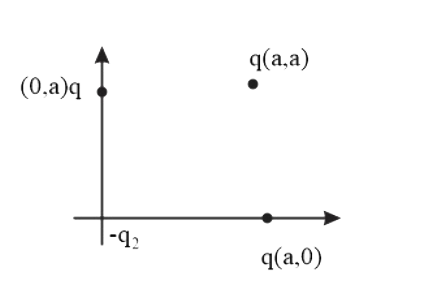The momentum of a moving particle given by p=tlnt. Net force acting on this particle is defined by equation F=dpdt. The net force acting on the particle is zero at time
t=0
t=1e
t=1e2
None of these
The correct Answer is:B
To solve the problem, we need to find the time at which the net force acting on the particle is zero. The momentum of the particle is given by the equation:
p=tlogt
The net force F acting on the particle is defined by the equation:
F=dpdt
Step 1: Differentiate the momentum with respect to time
We start by differentiating the momentum p with respect to time t:
dpdt=ddt(tlogt)
Using the product rule of differentiation, where u=t and v=logt:
dpdt=udvdt+vdudt
Calculating dudt and dvdt:
- dudt=1
- dvdt=1t
Now applying the product rule:
dpdt=t⋅1t+logt⋅1
dpdt=1+logt
Step 2: Set the force equal to zero
The net force F is given by:
F=dpdt
To find when the force is zero, we set the expression for dpdt equal to zero:
1+logt=0
Step 3: Solve for t
Now we solve the equation:
logt=−1
To eliminate the logarithm, we exponentiate both sides:
t=e−1
This simplifies to:
t=1e
Conclusion
Thus, the net force acting on the particle is zero at time t=1e.
We start by differentiating the momentum p with respect to time t:
- dvdt=1t
dpdt=1+logt
The net force F is given by:
Now we solve the equation:
Thus, the net force acting on the particle is zero at time t=1e.
Topper's Solved these Questions
- BOOK - ALLENCHAPTER - MISCELLANEOUSEXERCISE - Exersice-037videos
MISCELLANEOUS
- BOOK - ALLENCHAPTER - MISCELLANEOUSEXERCISE - ASSERTION-REASON18videos
MISCELLANEOUS
- BOOK - ALLENCHAPTER - MISCELLANEOUSEXERCISE - Part -II Example Some worked out Examples1videos
MISCELLANEOUS
- BOOK - ALLENCHAPTER - KINEMATICS (MOTION ALONG A STRAIGHT LINE AND MOTION IN A PLANE)EXERCISE - BEGINNER S BOX-78videos
KINEMATICS (MOTION ALONG A STRAIGHT LINE AND MOTION IN A PLANE)
- BOOK - ALLENCHAPTER - PHYSICAL WORLD, UNITS AND DIMENSIONS & ERRORS IN MEASUREMENT EXERCISE - EXERCISE-IV8videos
PHYSICAL WORLD, UNITS AND DIMENSIONS & ERRORS IN MEASUREMENT
Similar Questions
If net external force acting on the system is zero then
View SolutionOne of the forces acting on the particle is conservative, then
View SolutionThe net force acting is not zero on
View SolutionIf a constant force acts on a particle, its acceleration will
View SolutionCalculate the net force acting on the charge present at the origin.
 View Solution
View SolutionForce acting on a particle is given by F=A−xBt, where x is in metre and t is in seconds. The dimensions of B is -
View SolutionFour forces acting on a particle keep it in equilibrium, then :-
View SolutionThe linear momentum of a particle as a fuction of time 't' is given by , p = a +bt , where a and b are positive constants . What is the force acting on the particle ?
View SolutionFigure shows the displacement of a particle going along the X-axis as a function of time. The force acting on the particle is zero in the region
 View Solution
View SolutionA force (ˆi−2ˆj+3ˆk) acts on a particle lying at origin. What is the torque acting on the particle about the origin.
View Solution

